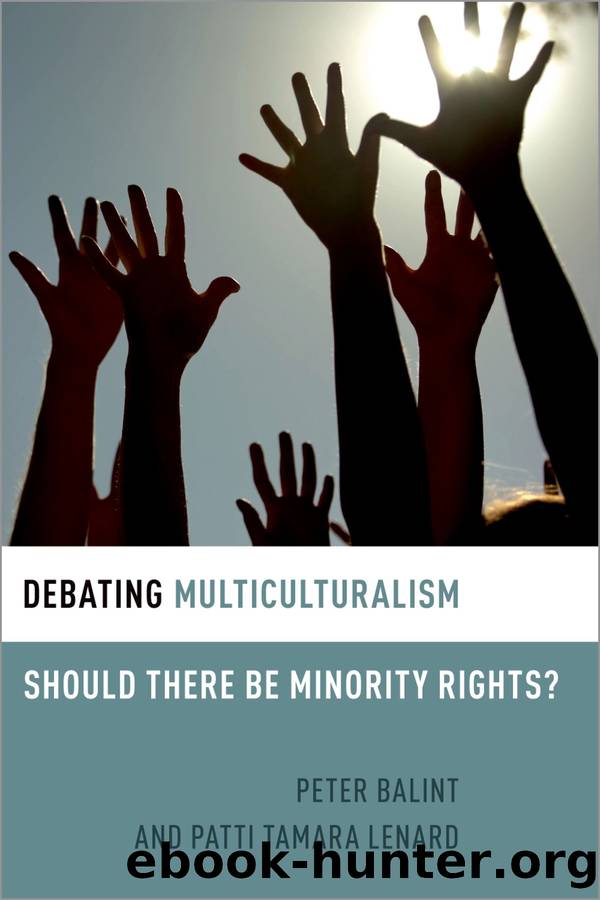Debating Multiculturalism by Patti Tamara Lenard

Author:Patti Tamara Lenard
Language: eng
Format: epub, pdf
Publisher: Oxford University Press
Published: 2021-06-15T00:00:00+00:00
Conclusion
In this chapter I have shown how neutral institutions (in terms of both justification and intent) can accommodate minority ways of life, and that nonneutral institutions can, albeit reluctantly, change to make these accommodations. This change can take two basic forms. First, it may involve removing majority privilege, for example, dismantling state religions, overturning bans on head and face coverings, or removing religious symbols from state schools. Second, it might involve directly redressing minority disadvantage while leaving everything else unchanged. Here an institution may grant minority rightsâthe police, for example, may decide that looking âsmartâ can involve turbans and headscarves in the same color as standard uniform headwear, and allow these for Sikhs and Muslims. Or a state may decide the history and centrality of its state religion is too important to abolish, and instead extend recognition and privileges to other major religions as well. These are examples of multicultural minority rights as forms of neutrality toward peopleâs ways of life.
As this discussion shows, and it is worth highlighting, neutralizing action may actually involve minority rights! Favoring the majority is nonneutral, and so adjusting an institution to add favor to the minority is a neutralizing action. In this sense, minority rights are a form of state neutrality. The reason I stress this is that it seems multiculturalists actually endorse neutrality in practice, if not in name. In this sense, we have come full circleâmy argument for neutrality (so far) is entirely compatible with an argument for minority rights. Given the argumentative framework set out earlierâwhere minority rights were directly opposed to liberal neutralityâthis point is significant in itself. Liberal neutrality does not fail to accommodate minority ways of lifeâeven if they require minority rights. Nevertheless, in the next chapter, I want to go further and argue for a form of neutrality that does not require minority rights at all, and this further position is opposed to minority rights. Here I will argue that the first way of realizing neutralityâremoving majority privilegeâis the best way of gaining minority accommodation, as it avoids many of the pitfalls of granting minority rights and has its own unique advantages in the form of more freedom for all of us.
Download
Debating Multiculturalism by Patti Tamara Lenard.pdf
This site does not store any files on its server. We only index and link to content provided by other sites. Please contact the content providers to delete copyright contents if any and email us, we'll remove relevant links or contents immediately.
The remains of the day by Kazuo Ishiguro(8999)
Tools of Titans by Timothy Ferriss(8396)
Giovanni's Room by James Baldwin(7346)
The Black Swan by Nassim Nicholas Taleb(7129)
Inner Engineering: A Yogi's Guide to Joy by Sadhguru(6796)
The Way of Zen by Alan W. Watts(6614)
The Power of Now: A Guide to Spiritual Enlightenment by Eckhart Tolle(5782)
Asking the Right Questions: A Guide to Critical Thinking by M. Neil Browne & Stuart M. Keeley(5775)
The Six Wives Of Henry VIII (WOMEN IN HISTORY) by Fraser Antonia(5515)
Astrophysics for People in a Hurry by Neil DeGrasse Tyson(5190)
Housekeeping by Marilynne Robinson(4447)
12 Rules for Life by Jordan B. Peterson(4304)
Ikigai by Héctor García & Francesc Miralles(4274)
Double Down (Diary of a Wimpy Kid Book 11) by Jeff Kinney(4272)
The Ethical Slut by Janet W. Hardy(4253)
Skin in the Game by Nassim Nicholas Taleb(4250)
The Art of Happiness by The Dalai Lama(4130)
Skin in the Game: Hidden Asymmetries in Daily Life by Nassim Nicholas Taleb(4007)
Walking by Henry David Thoreau(3962)
